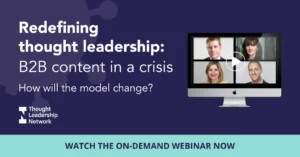Post Covid-19 crisis, thought leadership topics that will dominate in B2B
We are in uncharted waters. A crisis unlike anything ever before has engulfed the global economy and upended entire industries and business models. Many companies are fighting for their survival and still trying to adjust to an abruptly transformed business environment.
In the coming months, business leaders will be hungry for insight into how to navigate this extreme adversity. Brands that stay visible and provide valuable, relevant content to their audiences will build strong, lasting relationships with their customers and prospects.
But marketing and communications teams need to be careful. “Off message” themes that do not reflect the current context or act as though nothing has happened will be discarded. Poor timing with messaging will mean wasted efforts. Getting it wrong can be damaging for the brand and the relationship with its audience.
So, what does this mean for the themes that are likely to be in demand as the crisis unfolds? Many of the perennial thought leadership topics will remain on the agenda, but the tone and positioning will need to shift.
Here are our predictions for which thought leadership topics will be in greatest demand by business leaders over the coming months:
1. Resilience
This will be of the biggest thought leadership topics in late 2020 and beyond. Business leaders will be under pressure to ensure that their companies can withstand shocks like Coronavirus more effectively in future.
Insight into how to strike a balance between efficiency and resilience, and developing flexible, adaptable business models and processes that allow them to change tack quickly will be in high demand. Interest in risk management that enables leaders to better identify weak signals and “black swans” will grow, as well as approaches to responding quickly and decisively to risks across the business.
2. Leadership
Although leadership is a perennial topic on the thought leadership agenda, we expect interest in it to increase even further as companies seek to learn lessons from the current turmoil. Put simply, there is no blueprint to follow, so demand for insight into how to respond is sure to be high.
Popular themes are likely to include purpose-driven leadership; the shift from a command-and-control model to a more networked approach; along with interest in more informed decision-making, empathic communication and resilience. Many business leaders will have gone through immense stress and strain over the weeks and months, so interest in well-being, mental health and personal resilience will also be strong.
3. Supply chain
Images of empty supermarket shelves and the difficulties governments have in sourcing vital medical equipment have been powerful reminders of vulnerabilities in our global supply chains. So, expect to see a surge of interest in supply chain topics as business leaders seek to gain a better understanding of how to identify and mitigate risks to supply, while at the same time ensuring supply chains remain lean and efficient.
The risks of supply chain concentrations have once again come to the fore, with many companies seeing disruption that stems from quarantined areas in China. Many will be keen to address these vulnerabilities by gaining greater visibility into their logistics network and by being better aware of the risks.
4. Automation and AI
This will likely be a tricky topic to navigate. Concerns about automation’s potential to reduce the need for human workers may seem insensitive at a time when jobs have been cut. For many companies, investment in AI and automation have involved capital expenditure – something we expect to see much come under greater scrutiny in the months ahead. Yet interest in automation and AI is unlikely to wane. Instead, the focus will shift to using these technologies to drive operational improvements and seeking new ways to boost efficiency against a highly strained financial and economic backdrop.
5. Sustainability
It’s often said that interest in sustainability and environmental concerns is cyclical. It rises during positive times when there is less pressure on the cost base but drops dramatically during a downturn when companies need to focus on the fundamentals.
In the wake of the COVID-19 crisis, we don’t expect interest in sustainability and related topics, such as brand purpose to fall, but we do predict that it will change. It will broaden beyond the heartland of environmental, social and governance (ESG), which has dominated in recent years, to encompass broader themes around sustainable business models, financial stability and resilience. Purpose-related topics will also remain popular in a world in which a more empathic, inclusive approach to business will come to the fore.
6. Innovation
In the aftermath of the crisis, many companies will pivot to short-term business priorities. Cash flow, protecting the core business, even just survival will be key. This might suggest that interest in innovation may seem “off message”. But innovation becomes even more important during a downturn. The margin of error is smaller, so companies need to take a highly disciplined, strategic approach to securing the future of their businesses.
But getting it right can deliver outsized returns over the longer term, when other companies are busy retrenching. Business leaders will therefore be searching for insight into how to improve their approach to innovation, set the right priorities and get themselves on the path for future growth.
7. Digital
The major thought leadership topic of recent years is unlikely to disappear anytime soon, however, we expect the tone of it to change. Companies further ahead with their digital transformation are likely to perform better in the months that follow the crisis than those that are lagging behind, particularly if we see an extended period of social distancing and remote working.
But, as with innovation, the margin for error with these investments will be much narrower. Digital transformation efforts will face greater scrutiny and companies will adopt a more cautious approach, particularly if their balance sheets show signs of strain. But turning off the taps entirely will not be an option, so expect to see strong demand for insight into how to avoid costly mistakes and maximise chances of success.
Download our ebook for more specialist insight on these thought leadership topics and how to communicate now and in the aftermath of Covid-19.
 Over recent weeks, the business world as we know it has changed dramatically. Brands face the fight to remain relevant and leadership teams are being tested like never before. How will you need to change the way you produce thought leadership to remain distinctive and relevant?
Over recent weeks, the business world as we know it has changed dramatically. Brands face the fight to remain relevant and leadership teams are being tested like never before. How will you need to change the way you produce thought leadership to remain distinctive and relevant?
Find out by watching our on-demand webinar with experts from FT Longitude, Accenture, Mercer and Thought Leadership Network.






 Back
Back

 Book a meeting
Book a meeting
 Book a meeting
Book a meeting

